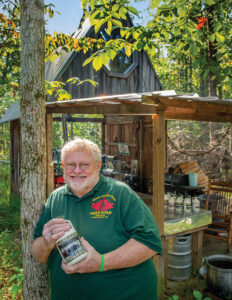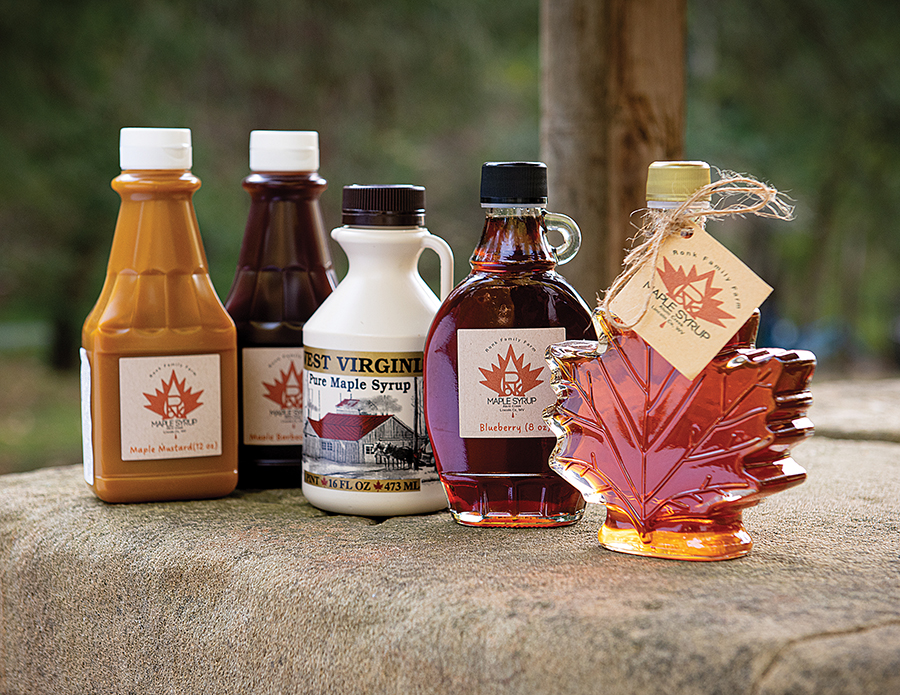Made in WV: Sugar Sweet Maple
More and more producers are tapping into the Mountain State’s official tree and hoping for sweet returns.

In 2024, the U.S. Department of Agriculture reported that 5.86 million gallons of maple syrup were produced nationally — a 17% jump from the previous year.
While many might still associate maple syrup with Canada and New England, production of this pantry staple is one of the fast-growing sectors in West Virginia agriculture. The sugar maple is our state tree, after all, and tapping maple trees to make sugar is rooted in our history.
From 2002 to 2016, the year the West Virginia Maple Syrup Producers Association was formed, the state went from producing just under 3,000 gallons of maple syrup to double that amount. In 2017, West Virginia was included in the USDA’s National Maple Survey, solidifying itself as an official maple-producing state, and received a three-year USDA Access and Development grant.
Production increased again to 9,000 gallons. This year, maple syrup production will reach an estimated 12,000 gallons, up from 11,000 gallons in 2023. The number of tree taps has also increased this year from 69,000 to 70,000.
And there’s even more potential for growth, said Paul Ronk, owner of Ronk Family Maple Farm in Alum Creek and president of the West Virginia Maple Syrup Producers Association.
“There are 4 million maple trees in West Virginia, and we only have 70,000 of them tapped,” Ronk said. “To see the growth that has happened in the last 10 years has been amazing. I really think that in another 10 years it’s going to just blow up.”
Ronk, a former missionary and dairy herdsman, was introduced to maple syrup production by a friend of his in Ohio. For 10 years, Ronk and his son Jacob would visit the friend’s farm to help with his maple syrup production. Finally, the friend encouraged Ronk to tap the maple trees he had on his own farm and gave him some equipment to get started.
“That was in January 2016, and we did 40 buckets that year,” recalled Ronk. “Now, mind you, I didn’t know it at the time, but people in West Virginia don’t do buckets.”
Ronk tried again the next year and doubled his production amount. He then went to the State Fair, where he spoke with other producers, and they told him about an educational maple camp.
“I went, and I came back really fired up,” Ronk said. “I put in the lines to 250 maple trees.”
Sadly, Ronk’s son, who had been his right-hand man during this venture, passed away in 2017; but Ronk continued in his honor. Now, he’s preparing for a major expansion.
“We’re buying a building across the road that will have a store, an FDA-approved commercial kitchen and all of my equipment,” said Ronk. “We’re also going to increase from 250 to 1,000 taps.”
Typically starting in January and running through March, maple syrup is the first crop of the season in West Virginia.
“In today’s economy, some people need a second income; and this is a good option,” Ronk said. “It’s something a farmer can do in the wintertime.”
Counties with higher elevations and colder temperatures such as Pendleton, Pocahontas, Preston and Tyler have the greatest number of producers. Spruce Knob Maple, located in Pendleton County, is the state’s largest producer.
“We have about 55 commercial producers in West Virginia, up from the 15-20 we had in 2016,” said Ronk. “One neat thing, though, is that there’s no competition here. Each producer here in the state, we’re not jealous of what the other ones are doing; we’re not worried about whether they’re going to sell their syrup or not. There’s not enough syrup being made in West Virginia to meet the need, so we can all sell with no problem.”
Currently, the West Virginia Maple Syrup Producers Association has 84 members, but that does not account for everyone making maple syrup in the state.
“We probably have 300-plus people who do it in their backyard for their own use,” Ronk estimated.
The number of taps each producer has varies widely, from a couple hundred to thousands.
Like Ronk, Kody Boone, owner of Boone Valley Farm in Lewis County and vice president of the West Virginia Maple Syrup Producers Association, considers himself a small producer. He has about 300 taps.
“I think most producers in West Virginia would be considered small producers, but what we produce is quality,” Boone said. “Small producers are always going to be the basis of the maple syrup industry in Appalachia. I want to encourage people who have agricultural ability and have 10, 20, 50, 100 or 200-acre lots to use what they have. You don’t have to have a 10,000-plus tap operation to do well for yourself. Just make some syrup. It’s a really fun hobby.”
In addition to offering trainings, resources and networking opportunities to its members, the West Virginia Maple Syrup Producers Association partners with Future Generations University in Franklin, West Virginia, to educate young, prospective producers.
“We have a full school curriculum that is designed from kindergarten all the way through 12th grade,” Ronk explained. “We give them the equipment and everything they need to show the students how to tap the tree, to take the sap into the classroom and cook it and to learn all about it. The more people we educate about this, the more interest there will be from young people to stay in the state.”
